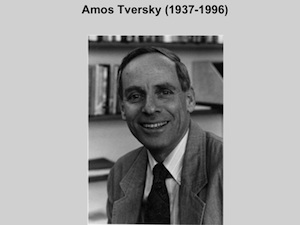You can read Jonah Lehrer's recent review of Kahneman's work at the Wall Street Journal.
Audio
| Daniel Kahneman [9.12.11] |
Read the whole article.The Marvels and the Flaws of Intuitive ThinkingEdge Master Class 2011
Daniel Kahneman [9.12.11]
DANIEL KAHNEMAN is the Eugene Higgins Professor of Psychology Emeritus, Princeton University; Recipient, the 2002 Nobel Prize in Economic Sciences; Author, Thinking Fast and Slow (forthcoming, October 25, 2011).
Daniel Kahneman's Edge Bio Page
The Marvels and the Flaws of Intuitive Thinking
The marvels and the flaws that I'll be talking about are the marvels and the flaws of intuitive thinking. It's a topic I've been thinking about for a long time, a little over 40 years. I wanted to show you a picture of my collaborator in this early work. What I'll be trying to do today is to sort of bring this up-to-date. I'll tell you a bit about the beginnings, and I'll tell you a bit about how I think about it today.
This is Amos Tversky, with whom I did the early work on judgment and decision-making. I show this picture in part because I like it, in part because I like very much the next one. That's what Amos Tversky looked like when the work was being done. I have always thought that this pairing of the very distinguished person, and the person who is doing the work tells you something about when good science is being done, and about who is doing good science. It's people like that who are having a lot of fun, who are doing good science.
We focused on flaws of intuition and of intuitive thinking, and I can tell you how it began. It began with a conversation about whether people are good intuitive statisticians or not. There was a claim at the University of Michigan by some people with whom Amos had studied, that people are good intuitive statisticians. I was teaching statistics at the time, and I was convinced that this was completely false. Not only because my students were not good intuitive statisticians, but because I knew I wasn't. My intuitions about things were quite poor, in fact, and this has remained one of the mysteries, and it's one of the things that I'd like to talk about today — what are the difficulties of statistical thinking, and why is it so difficult.
We ended up studying something that we call "heuristics and biases". Those were shortcuts, and each shortcut was identified by the biases with which it came. The biases had two functions in that story. They were interesting in themselves, but they were also the primary evidence for the existence of the heuristics. If you want to characterize how something is done, then one of the most powerful ways of characterizing the way the mind does anything is by looking at the errors that the mind produces while it's doing it because the errors tell you what it is doing. Correct performance tells you much less about the procedure than the errors do.
We focused on errors. We became completely identified with the idea that people are generally wrong. We became like prophets of irrationality. We demonstrated that people are not rational. We never liked this, and one of the reasons we didn't was because we were own our own best subjects. We never thought we were stupid, but we never did anything that didn't work on us. It's not that we're studying the errors of other people, we were constantly studying the way our own minds worked, and even when we knew better, we were able to tell what were the mistakes that were tempting to us, and basically we tried to characterize what were the tempting mistakes.
That was 40 years ago, and a fair amount has happened in the last 40 years.



No comments:
Post a Comment